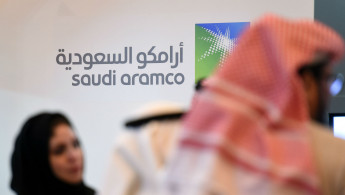Saudi Aramco looks to buy stake in top petrochemical firm ahead of IPO move
The state-owned oil giant is looking to boost its petrochemicals portfolio to help attract investors ahead of its much-touted stock market listing.
2 min read
The Aramco IPO is the centerpiece of an ambitious Vision 2030 reform programme [Getty]
State oil giant Saudi Aramco said on Thursday it is looking to invest in Saudi petrochemical maker SABIC, the world's fourth biggest chemical firm, a move officials hope could boost the company's valuation ahead of a long-awaited stock market listing.
Aramco said it was in "very early-stage discussions" with the kingdom's Public Investment Fund (PIF) to buy the stake in SABIC via a private transaction, though it has no plans to acquire any publicly held shares, it said in a statement, reported by Reuters.
In a separate statement, the PIF said talks about a sale were in early stages and that "there is a possibility that no agreement will be reached".
Aramco wants to develop its downstream business as the government prepares for a much-touted public offering of 5 percent of the world's largest oil producer. Saudi officials are reportedly seeking a $2 trillion market valuation, though oil and finance analysts are skeptical the kingdom will achieve its ambitious target.
Boosting its petrochemicals portfolio further could help attract investors for the IPO, Reuters said.
Saudi Arabia's finance minister said in April that the stock market debut of Aramco will be launched in 2018 if market conditions permit, while Aramco's boss said whether to list the company on the Saudi exchange alone, on a stock market abroad or seek a dual listing was yet to be decided by the government.
Aramco said it was in "very early-stage discussions" with the kingdom's Public Investment Fund (PIF) to buy the stake in SABIC via a private transaction, though it has no plans to acquire any publicly held shares, it said in a statement, reported by Reuters.
In a separate statement, the PIF said talks about a sale were in early stages and that "there is a possibility that no agreement will be reached".
Aramco wants to develop its downstream business as the government prepares for a much-touted public offering of 5 percent of the world's largest oil producer. Saudi officials are reportedly seeking a $2 trillion market valuation, though oil and finance analysts are skeptical the kingdom will achieve its ambitious target.
Boosting its petrochemicals portfolio further could help attract investors for the IPO, Reuters said.
Saudi Arabia's finance minister said in April that the stock market debut of Aramco will be launched in 2018 if market conditions permit, while Aramco's boss said whether to list the company on the Saudi exchange alone, on a stock market abroad or seek a dual listing was yet to be decided by the government.
Riyadh-listed SABIC is 70 percent owned by the PIF.
The Aramco IPO is the centerpiece of Crown Prince Mohammed bin Salman's "Vision 2030" reform programme, which aims to wean the economy off its reliance on oil revenues.
Saudi Arabia, which counted on crude for more than 90 percent of its public revenues, has struggled to bounce back from a 2014 oil market crash triggered by a global oil glut.





 Follow the Middle East's top stories in English at The New Arab on Google News
Follow the Middle East's top stories in English at The New Arab on Google News
![The UAE is widely suspected of arming the RSF militia [Getty]](/sites/default/files/styles/image_330x185/public/2024-11/GettyImages-472529908.jpg?h=69f2b9d0&itok=Yauw3YTG)
![Netanyahu furiously denounced the ICC [Getty]](/sites/default/files/styles/image_330x185/public/2024-11/GettyImages-2169352575.jpg?h=199d8c1f&itok=-vRiruf5)
![Both Hamas and the Palestinian Authority welcomed the ICC arrest warrants [Getty]](/sites/default/files/styles/image_330x185/public/2024-11/GettyImages-2178351173.jpg?h=199d8c1f&itok=TV858iVg)